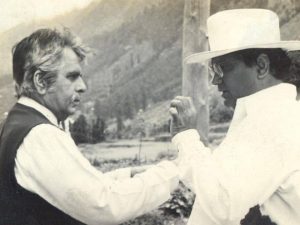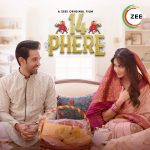The death of a stalwart like Dilip Kumar has left a big void in the Hindi film industry. There will not be much debate for Dilip Kumar as the greatest actor of Hindi cinema. There are also actors like Amitabh Bachchan, Sanjeev Kumar, Naseeruddin Shah and Aamir Khan who could be spoken in the same breath as him, but he has influenced a lot more actors. Manoj Kumar and Rajendra Kumar were big stars of their period but as an actor, we could see a lot of influence of Dilip Kumar on them. There was a lot of method to his acting performances in his films and was never over the top in any of his performances.
My memories of his films are more in the ’80s with ‘Kranti’ (1981), ‘Shakti’ (1982), ‘Mazdoor’ (1983), ‘Mashaal’ (1984), ‘Karma’ (1986), ‘Izzatdaar’ (1990) and ‘Saudagar’ (1991). Despite ageing and working with younger actors, he had more prominent roles in most of these films as he played strong characters in these films. We saw him playing a District Collector, Deputy Commissioner of Police, Newspaper Editor, etc. We also know during that era, all popular actors were having almost 6 to 8 commercial potboiler releases in a year. He did a few quality films where his acting performances are remembered today also.

B.R.Chopra’s ‘Naya Daur’ (1957), Bimal Roy’s ‘Madhumati’ (1957) and K.Asif’s ‘Mughal-E-Azam’ (1960) are important films of his career and are cult classics of Indian cinema. These films have taken Indian cinema ahead with storytelling and filmmaking. There was more passion attached to these films than commerce. Tapi Chanakya’s ‘Ram Aur Shyam’ (1967) was one more successful film of his career, where he played a double role of twin brothers separated at birth. This movie has been an inspiration to films with similar storylines like ‘Seeta Aur Geeta’ (1972), ‘Chaalbaaz’ (1989) and ‘Kishen Kanhaiya’ (1990).
Nitin Bose’s ‘Ganga Jamuna’ (1961) is rated as the best acting performance of Dilip Kumar in his career. He played the role of a dacoit criminal named ‘Ganga’. The film was about siblings’ rivalry on opposing sides of the law, one a dacoit criminal and the other a police officer. The film was also notable for its Technicolor production, use of the Awadhi dialect, and its rustic setting and it was a defining example of the dacoit film genre in Hindi cinema. Dilip Kumar’s performance is rated as one best acting performance in Indian cinema and is also one of best examples for method acting performance.
He is also known as the tragedy king. In his early films, his characters were more on the tragic side and with the right intensity, he played these roles was top notch. Bimal Roy’s ‘Devdas’ (1955) was one of his best tragic roles. Lot of his roles also had grey shades compared to Raj Kapoor and Dev Anand, who were playing more of a hero. He was not afraid to experiment as an actor during those times. One of his memorable films for me was A. Bhimsingh’s Aadmi’ (1968) with Waheeda Rahman and Manoj Kumar. He played a jealous husband on a wheelchair, doubting an illicit relationship between his wife and his friend. ‘Gopi’ (1970) again under the same director was another interesting film with more fun and frolic.
Mehboob Khan’s ‘Andaz’ (1949) is one of the underrated love triangles of Hindi cinema with Raj Kapoor, Nargis Dutt and Dilip Kumar. The scenes between Raj Kapoor and Dilip Kumar are highlights of the film. Again Ramesh Sippy’s ‘Shakti’ (1982) was a big clash of stalwarts like him and Amitabh Bachchan where they played father and son on opposite sides of the law. Dilip Kumar was more of an idealist and Amitabh Bachchan was more of an angry man image. They played to their strengths and to the gallery. But the ultimate was clash of titans in Subash Ghai’s ‘Saudagar’ (1991) with the dynamic Raaj Kumar and him. They played friends turned foes. The dialogues between them in clash scenes were highly superlative for their fans.
Dilip Kumar may have bid adieu to the world, but he will remain alive with his films.
Disclaimer: The preceding article was solely written by the author named above. Any views and opinions expressed are not necessarily shared by KiaGia.com. Questions or concerns about the preceding article can be directed to the author or posted as a comment below.

